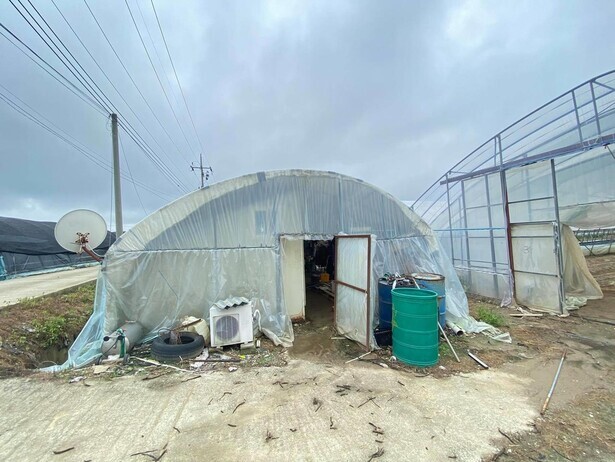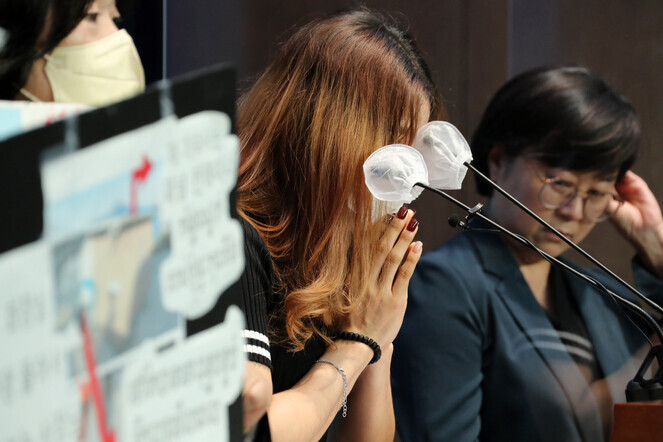hankyoreh
Links to other country sites 다른 나라 사이트 링크
Pick 40,000 leaves a day or lose pay: Migrant workers in S. Korea locked into dire conditions

Meimei (alias), a migrant farm worker who was employed at a strawberry farm in Iksan, North Jeolla Province, had to switch her workplace in July after only five months on the job.
“Our boss peered into our bathroom, so we left the farm,” she said.
Meimei’s employer had been caught peeping into the shower inside the women’s living quarters. The only thing she could do to escape such sexual violence was to request ask her employer to allow her to switch workplaces, as the business owner must consent to such changes.
“It’s not our fault that we couldn’t stay at our living quarters any longer because of how anxious we were. But because we were so fed up, we couldn’t demand an explanation for the incident as well as for the additional hours we worked,” Memei continued.
It has been confirmed that migrant farm workers from Cambodia have had their wages withheld, been given inappropriate housing, and endured sexual violence in South Korea. Migrant Labor 119, a support group for migrant workers, held a press conference on Tuesday, where they announced the findings of the 554 consultations it provided to 334 Cambodian migrant farm workers in the last year.
Last year, 3,477 Cambodian migrant workers entered South Korea through the employment permit system. Of the 16 countries where the employment permit system was introduced, Cambodia accounted for the highest number of migrant workers in South Korea.
According to consultations Migrant Labor 119 conducted from September 2021 through August 2022, 344 laborers accounted for a total of 594 consultations, with a significant number of laborers experiencing a mix of issues.
The most popular issue was that of “switching workplaces,” which accounted for 114 consultations (19.2%), while 87 consultations (14.6%) were related to “wage issues” concerning wages being withheld, overtime work, and severance pay. Issues concerning “housing,” such as inappropriate living quarters or exorbitant rent, which accounted for 83 consultations (14%), followed. Women made up 76% of the workers seeking counsel from the organization.

One in three migrant workers (30.8%) complained of wage issues such as wages being withheld, employers charging exorbitant rent, and long work hours. Bopha (alias), who worked at a sesame leaf farm in Miryang, South Gyeongsang Province, had to pick 40 kilograms, or 40,000 sesame leaves, per day on account of having signed — at their employer’s behest — a consent form granting their employer permission to deduct from their wages pay commensurate to the amount by which they failed to meet their daily quota. Although Bopha’s contract granted them three hours of recess, they would in reality only rest for one hour and work for the remaining two.
Oftentimes, cases involved employment contracts that didn’t specify the address of the workplace or were unclear about how long employees were afforded for rest. Set-off agreements that stipulated workers to offset their room and board by two additional hours of daily labor were found in Icheon, Gyeonggi Province, and Eumseong, North Chungcheong Province, as well.
Housing was a serious issue among migrant workers. 83 migrant workers (14%) raised concerns about their living quarters or excessive rent during the consultation process. They either experienced their living quarters being moved from so-called “sandwich panel” houses to nearby residential buildings, or their wages being cut excessively. Last year, employers in the cities of Nonsan and Miryang provided empty or abandoned houses without registrations to laborers without properly repairing them, causing the heating bill to reach as high as 600,000 won during the winter. Among the 66 workers whose housing situation was apprehended, 30 lived in vinyl greenhouses, 15 lived in sandwich panel houses, 8 in freight containers, 6 in apartments, and 5 in abandoned houses.
Unstable housing led to sexual violence. Migrant Labor 119 revealed that it provided 11 sexual violence consultations in the last year. In spring of 2021, an employer in their 40s sexually assaulted a migrant laborer in their 20s in Nonsan, South Chungcheong Province. The employer habitually sexually assaulted the employee, making them live in a vinyl greenhouse during the summer and temporarily letting them stay in their own apartment during the winter.
Jeong Yeong-seob, an activist with Migrant Labor 119, stated, “The current policy prohibiting [employees] from switching workplaces [without the consent of their employer] despite the various human rights violations they face is shackling migrant laborers from proactively raising complaints.” He added, “This is why we need to prioritize the freedom to switch workplaces freely.”
By Jang Hyeon-eun, staff reporter
Please direct questions or comments to [english@hani.co.kr]

Editorial・opinion
![[Column] Season 2 of special prosecutor probe may be coming to Korea soon [Column] Season 2 of special prosecutor probe may be coming to Korea soon](https://flexible.img.hani.co.kr/flexible/normal/500/300/imgdb/original/2024/0426/3317141030699447.jpg) [Column] Season 2 of special prosecutor probe may be coming to Korea soon
[Column] Season 2 of special prosecutor probe may be coming to Korea soon![[Column] Park Geun-hye déjà vu in Yoon Suk-yeol [Column] Park Geun-hye déjà vu in Yoon Suk-yeol](https://flexible.img.hani.co.kr/flexible/normal/500/300/imgdb/original/2024/0424/651713945113788.jpg) [Column] Park Geun-hye déjà vu in Yoon Suk-yeol
[Column] Park Geun-hye déjà vu in Yoon Suk-yeol- [Editorial] New weight of N. Korea’s nuclear threats makes dialogue all the more urgent
- [Guest essay] The real reason Korea’s new right wants to dub Rhee a founding father
- [Column] ‘Choson’: Is it time we start referring to N. Korea in its own terms?
- [Editorial] Japan’s rewriting of history with Korea has gone too far
- [Column] The president’s questionable capacity for dialogue
- [Column] Are chaebol firms just pizza pies for families to divvy up as they please?
- [Column] Has Korea, too, crossed the Rubicon on China?
- [Correspondent’s column] In Japan’s alliance with US, echoes of its past alliances with UK
Most viewed articles
- 1After election rout, Yoon’s left with 3 choices for dealing with the opposition
- 2Two factors that’ll decide if Korea’s economy keeps on its upward trend
- 3Noting shared ‘values,’ Korea hints at passport-free travel with Japan
- 4AI is catching up with humans at a ‘shocking’ rate
- 5Why Kim Jong-un is scrapping the term ‘Day of the Sun’ and toning down fanfare for predecessors
- 6South Korea officially an aged society just 17 years after becoming aging society
- 7Korea’s 1.3% growth in Q1 signals ‘textbook’ return to growth, says government
- 8Value of Korean won down 7.3% in 2024, a steeper plunge than during 2008 crisis
- 9‘We must say no’: Seoul defense chief on Korean, USFK involvement in hypothetical Taiwan crisis
- 10Is Japan about to snatch control of Line messenger from Korea’s Naver?